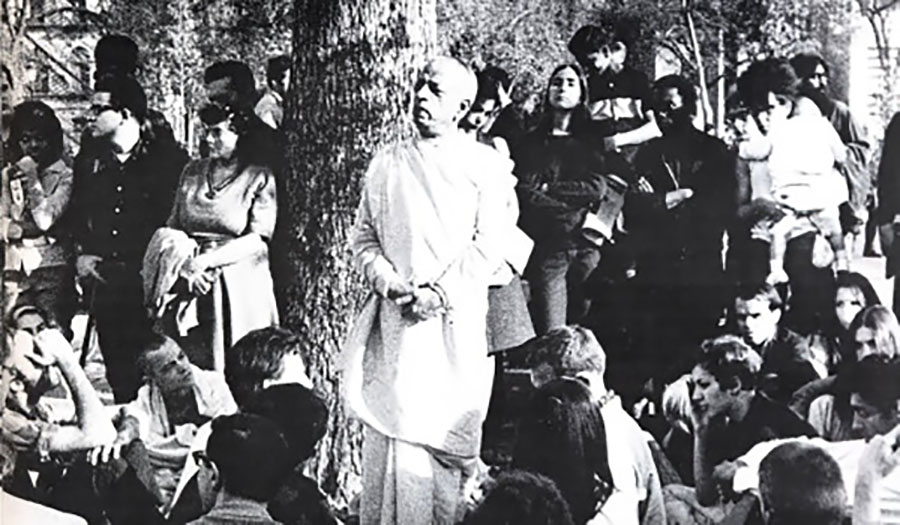ISKCON 50 Meditations: September 15, 2016
By Satsvarupa dasa Goswami | Sep 15, 2016

The Power of Faithful Hearing from One’s Spiritual Master
When Krishna appeared on the battlefield of Kuruksetra, He was about ninety years old Prabhupada said. By that time in His life, Krishna had married 16,108 wives. Each of His wives had ten children by the Lord, and each of those children married and had their own children as well. So Krishna was a great grandfather, with a family numbering in the millions. And yet He looked like a beautiful youth, no more than sixteen or twenty years old. Whenever I hear “fantastic” details of Krishna’s life, I put myself in the position of an innocent person who never heard of Krishna before. “What will they think?” And then I remember how I first thought when I heard of Krishna and His wives and gopis.
How did Srila Prabhupada convince us? He did it on the basis of perfect, Vedic authority. He also gave the evidence of powerful scholars and sages who accept everything that Krishna says and does. Prabhupada explained: Since Krishna is the Supreme Personality of Godhead, nothing is impossible for Him. Why be astounded that He had 16,000 wives, since He lives in the hearts of all the innumerable living entities?
I have become faithful in accepting the way that Prabhupada thinks about Krishna. When I hear that Krishna married 16,000 wives I accept it calmly, because I accept Srila Prabhupada. I can empathize, but reject the reductionist’s explanation of Krishna consciousness. I can defend it myself against the atheists. And yet I admit to the simple faith: I accept Krishna as God because Prabhupada said that He is the Personality of Godhead.
The acceptance of spiritual truth, such as I’ve mentioned about Krishna and His super-human lila, is sometimes given the name “dogma”. The dictionary definition of dogma is “a philosophical tenet; a theological doctrine authoritatively inserted; a principle or belief.” In ordinary usage, dogma is derided as opposed to the truth, which is free and dynamic. Dogma implies dullness and fear. The religionist is supposed to be afraid to even think, lest he begin to lose his faith. However, there is another way to look at it. It’s not wrong that some conclusions are settled once and for all. Even Descartes, in attempting to dismantle all dogmatic beliefs, arrived at his “I think, therefore I am.” Everyone works from a preference, even if it’s “nothing is certain” or “nothing exists”. We accept the theistic proofs of sastra, and we have learned how to defend them. More important, by following them we gain direct realization of Krishna, His name, His form, His loving service.
Prabhupada criticized the speculations of an imperfect philosopher. But he encouraged us to think, meditate, worship. It is not dogmatic. We are not afraid to look and think. But for subjects that are beyond the human jurisdiction, we can take guidance from the Lord and His pure devotee. When I meditate on Prabhupada or Sri Krishna, it is they who are meditating within me; just as when you pray, it is Krishna and the spiritual master who are praying with you. This is faithful meditation. And when the devotee becomes confused or doubtful, he places an inquiry before the Lord: This is my doubt, O Krishna, and but for Yourself, I have found no one who can answer it.















